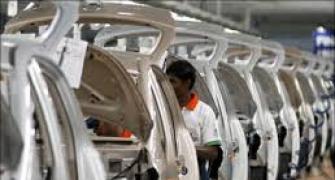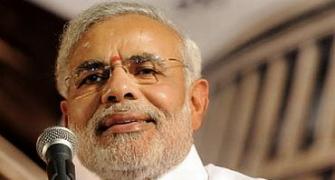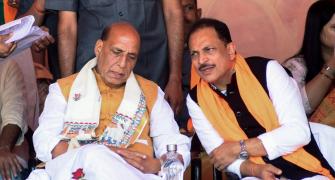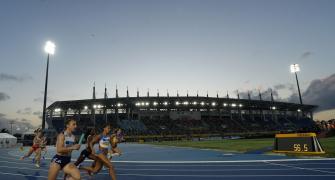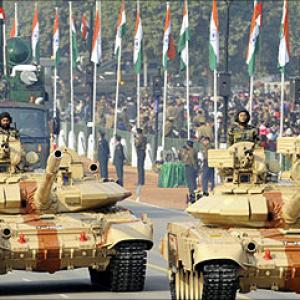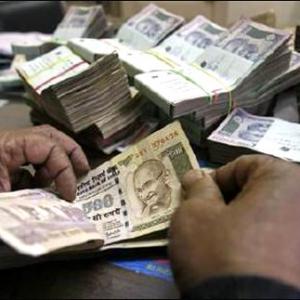 Indian Chamber of Commerce, in its pre-budget memorandum, has asked for corporate tax rate in India to be brought down to the global average of 25 per cent to regain the growth momentum.
Indian Chamber of Commerce, in its pre-budget memorandum, has asked for corporate tax rate in India to be brought down to the global average of 25 per cent to regain the growth momentum.
The chamber also suggested that levies like surcharge and education cess must be removed to generate more investible surplus with the corporates.
It strongly objected to the proposed GAAR rules and said the practice of retrospective amendment of tax laws must be given a go by at this juncture.
In a meeting with Union Finance Ministry officials, the city-based chamber spoke of necessity to incentivise investment flows and suggested restoration of the earlier depreciation rate of 25 per cent and extension of additional depreciation of 20 per cent to all machinery and plants, it said in a statement.
It emphasised that agricultural infrastructure needs considerable investments and hence Section 80IA benefits must be extended to all such investments like IT infrastructure, computers, VSAT, solar panels, water harvesting facilities, storage etc.
To build infrastructure facilities, construction companies should begranted relief from MAT, the chamber suggested.
On indirect taxes, the chamber strongly emphasised on the need to introduce the GST urgently, which would help bring down cost of manufacture by avoiding cascading effect of taxes.
Odisha calls for doing away with the upper ceiling on professional tax
Odisha has called for doing away with the upper ceiling on professional tax.
Asper Article 276 of the Constitution of India, the upper ceiling for profession tax is kept at Rs 2,500 per annum.
This has not been revised in the last 24 years.
Orissa state government gas requested the Union Finance Ministry to do away with the upper ceiling and allow the states to levy professional tax on progressive basis.
Odisha state government seeks funds for National Waterway-5
Realising the importance of the NationalWaterway-5 that would connect Paradeep and Dhamra ports with the steel and coal hinterlands at Kalinganagar and Talcher, the Odisha government has sought Budgetary allocation for the project.
"The National Waterway-5 will help reduce vehicular traffic by road and its negative impact on the environment, save fuel and energy consumption.
“Government of India may provide funds for the project in Union Budget for2014-15," state finance minister Pradip Amat stated in a pre-Budget note submitted to the Union finance ministry.
Pelletmakers seek sops to process iron ore dumps
Pellet Manufacturers' Association of India, representing pellet making companies have urged the government to provide incentives to use the150 million tonnes of low grade iron ore dumped as waste by miners.
Steel companies generally prefer ore with iron content of 63-64 per cent,while the one with less than 60 per cent iron content are dumped near themines.
Pellet Manufacturers' Association of India, has asked the government should to consider reducing the royalty on sale of these low grade iron ore dumps to make the process of beneficiation viable.
Reducing royalty would not only help dispose the dumps safely but also aid in conserving key ingredient used in steel-making.
Shortage of iron ore
Steel companies are facing huge shortage of iron ore after the Supreme Court banned mining in Karnataka, Odisha and Goa to crack down onillegal miners.
The short supply has eased a bit with mining in Karnataka limping back to normalcy.
The low grade iron ore dumps, if not properly disposed, disintegrate during monsoon and may cause harm to environment.
According to the Indian Bureau of Mines, ore with about 45 per cent iron content should be put to use by way of beneficiation.
Pellet is the purest form of iron ore used in steel making.
Plea to remove export duty
The Pellet Manufacturers' Association of India has asked the government to remove the 5 per cent export duty imposed by the previous government.
It has argued that this levy is choking the industry and will stunt its growth.
The lower domestic demand has resulted in lower capacity utilisation of less than 50 per cent against the global average of 80 per cent, according to the association.
Pellet exports have almost come to a standstill ever since the government imposed the 5 per cent customs duty.
With large steel players setting up their own pellet plants and exports hit by the duty, the capacity utilisation of standalone pellet plants are expected to drop further.
India has an installed pellet making capacity of 67 million tonnes as of March, 2014. It is estimated to touch 91 mt by the end of this fiscal.
Most large steel companies such as Tata Steel (3 million tonnes), JSW Steel (3 mt), Essar Steel (6 mt), Jindal Steel and Power (3 mt) have invested heavily in pellet plants in Chhattisgarh and Odisha.
Private airport operators demand infrastructure status
Associationof Private Airport Operators has demanded infrastructure status for airport support services and sought various tax benefits in the Union Budget 2014-15.
APAO has also supported the airlines' demand of including Aviation Turbine Fuel in 'Declared Goods' category to bring about a uniform tax across the country.
In a memorandum to Finance Minister Arun Jaitley, APAO has suggested that private airport operators should be allowed to issue tax free bonds for creation of aviation infrastructure as was allowed in railways, power, housing and highways development.
It also demanded that the hike in withholding tax from 10 to 25 per cent be withdrawn.
It suggested that Central Board of Excise and Customs should amend the law on allowance in bad debts in the infrastructure sector to provide relief to the service providers.
Rubber industry demands change in the inverted duty structure
Inverted duty structure has been the bane of the rubber sector in India and has stifled the growth of this vital sector of manufacturing.
AIRIA expects the new government to address this anomaly in the budget.
In its pre-budget submission to the Ministry of Finance, AIRIA has stated that finished products can easily be imported as import duty on rubber products is in the range of 0 to 10per cent, while the duty on raw materials for the rubber industry is between 5per cent and 70per cent.
Not only is the import duty on raw materials higher, but so also is the duty levied even on raw materials not produced in the country.
If the idea is domestic value addition, this anomaly needs to be corrected.
The Rubber industry, dominated by around 6,000 micro, small and medium-sized manufacturing units in different clusters spread across the country, is pinning its hopes on a correction in the inverted duty structure in the next Union Budget.
According to AIRIA, stiff import duties on raw materials have eroded competitiveness of the rubber industry.
On the other hand, lower taxation and export incentivisation policies of countries like China have helped manufacturers there to flood the Indian market withcheaper products.
The rubber sector has, therefore, asked for a Safeguard Duty on finished rubber products so that the domestic manufacturers, particularly SMEs, get a level-playing field.
AIRIA says that the import duty on raw materials is the highest in India when compared to the neighboring rubber products manufacturing countries.
For instance, import duty on natural rubber in China is 10per cent as against 20per cent or Rs 30 per kg in India.
On NR latex, the import duty is 70per cent in India while it is just 10per cent in China.
Similarly, in case of synthetic rubbers like SBR and PBR, the importduty is 7.5 per cent in China as against 10 per cent in India.
India is deficit in both natural rubber and synthetic rubbers.
On the other hand, the import duty on finished rubber goods is the lowest in India compared to other rubber-consuming nations, facilitating the import of cheaper goods to India.
For instance, on tubes, pipes and hoses, the import duty in China is 10per cent and above, in India, these can be imported for even as low as 6per cent.
Rubber rice de-husking rolls, widely used in rice mills across the country, can be imported duty free while China imposes up to 80per cent duty on the same.
Further, AIRIA has stated that the drawback duty of at least 5 per cent should be fixed on the reclaim rubber instead of 2per cent at present.
Reclaim rubber plays a vital part in environment conservation as discarded tyres and other rubber products are crushed and regenerated.
According to AIRIA, there is an urgent need to upgrade the technology in large number of Rubber SMEs.
With a view to improve productivity, aTechnology Upgrade Fund to upgrade the present technology be made available to the MSME sector at a rate of 5per cent interest.
High cost of finance, inflation, volatility in raw material availability and prices has retarded the technology upgradation drive amongst Rubber MSMEs in India.
Vidarbha farmers body VJASdemands Rs 30,000 crore (Rs 300-billion) package
Farmers body in the Maharashtra's Vidarbha region -- Vidarbha Jan Andolan Samiti -- has demanded an Rs 30,000 crore (Rs 300 billion) development package from the upcoming Union Budget 2014-15.
VJAS, an advocacy group for farmers, said they have demanded an Rs 30,000-crore (Rs 300-billion) package which would take care of the huge backlog for the region, help sustainable crop promotion, support mega micro irrigation schemes and other infrastructure development in the region.
The group has also urged the government to constitute anational-level Commission, which looks into measures to prevent farmer suicides.
The major demands of the farmers include -- minimum support price for cotton and soybean to match the cost of production with a 50 per cent profit margin, new crop loan to farmers after waiving their existing debt dues, bringing new technology in agriculture and irrigation.
Also financial assistance for farm widows and higher education facilities to their wards has been demanded.
Please click here for the Complete Coverage of Budget 2014 -15



